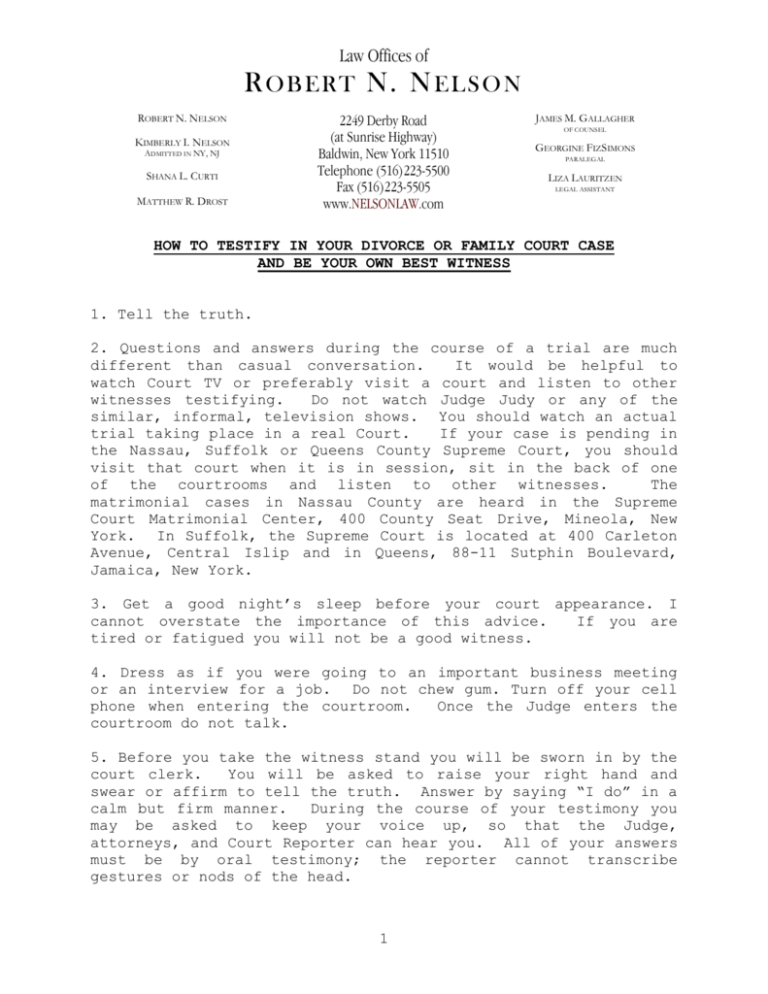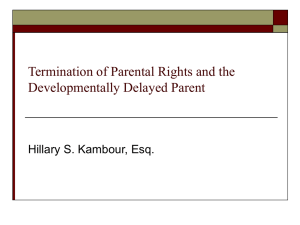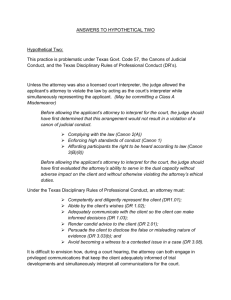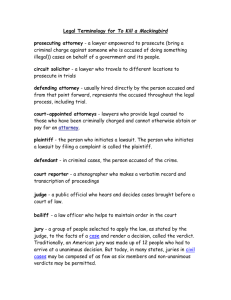How to Testify in Your Divorce or Family Court Case
advertisement

Law Offices of R OB E R T N. N E L S O N ROBERT N. NELSON KIMBERLY I. NELSON ADMITTED IN NY, NJ SHANA L. CURTI MATTHEW R. DROST 2249 Derby Road (at Sunrise Highway) Baldwin, New York 11510 Telephone (516) 223-5500 Fax (516) 223-5505 www.NELSONLAW.com JAMES M. GALLAGHER OF COUNSEL GEORGINE FIZS IMONS PARALEGAL LIZA LAURITZEN LEGAL ASSISTANT HOW TO TESTIFY IN YOUR DIVORCE OR FAMILY COURT CASE AND BE YOUR OWN BEST WITNESS 1. Tell the truth. 2. Questions and answers during the course of a trial are much different than casual conversation. It would be helpful to watch Court TV or preferably visit a court and listen to other witnesses testifying. Do not watch Judge Judy or any of the similar, informal, television shows. You should watch an actual trial taking place in a real Court. If your case is pending in the Nassau, Suffolk or Queens County Supreme Court, you should visit that court when it is in session, sit in the back of one of the courtrooms and listen to other witnesses. The matrimonial cases in Nassau County are heard in the Supreme Court Matrimonial Center, 400 County Seat Drive, Mineola, New York. In Suffolk, the Supreme Court is located at 400 Carleton Avenue, Central Islip and in Queens, 88-11 Sutphin Boulevard, Jamaica, New York. 3. Get a good night’s sleep before your court appearance. I cannot overstate the importance of this advice. If you are tired or fatigued you will not be a good witness. 4. Dress as if you were going to an important business meeting or an interview for a job. Do not chew gum. Turn off your cell phone when entering the courtroom. Once the Judge enters the courtroom do not talk. 5. Before you take the witness stand you will be sworn in by the court clerk. You will be asked to raise your right hand and swear or affirm to tell the truth. Answer by saying “I do” in a calm but firm manner. During the course of your testimony you may be asked to keep your voice up, so that the Judge, attorneys, and Court Reporter can hear you. All of your answers must be by oral testimony; the reporter cannot transcribe gestures or nods of the head. 1 6. You should review your Statement of Net Worth and prior sworn statements and/or deposition testimony if applicable. However, you should not try to memorize your prior statements. Your spouse’s attorney will be reviewing the same documents for purposes of cross-examination, trying to find inconsistencies. You will be able to provide more truthful and accurate testimony if you are familiar with your own prior statements. However, when you are testifying, do not try to remember what you said in a prior statement. When a question is asked, visualize what actually occurred and give your answer accordingly. If your answers sound rehearsed, as if you were reading lines from a play, your testimony will lose its effectiveness even if true. 7. Sometimes the Judge will tell you to answer yes or no and you must comply if you can. If you cannot truthfully answer the question with a “yes” or “no”, you have the right to explain your answer. It is much better to explain the answer than to give a simple yes or no if the yes or no will be incorrect or untrue. If this should occur, tell the Judge that you cannot answer the question with a “yes” or “no.” 8. Cross examination can be frustrating because your spouse’s attorney will be asking leading questions rather than open-ended questions. This is permissible on cross but not on direct examination. If your spouse’s attorney asks an open-ended question that will allow you to explain with a full answer, (rather than just a “yes” or “no” answer), take the opportunity to explain. If the Judge restricts you to a yes or no answer, do as the Court directs. I will have the opportunity to ask you further questions on redirect examination and at that time you will be able to explain and/or expand upon any questions for which you were restricted to a “yes” or “no” answer. 9. Be serious at all times. It is acceptable to smile at a humorous remark made by the Judge or one of the attorneys, but you should not otherwise participate in the humor or attempt to make humorous remarks of your own. 10. If I am asking questions on your direct testimony look at me or the Judge when you give your answers. If the Judge asks a question look at him or her and make eye contact. Do not put your hand in front of your mouth while answering. Be respectful to your spouse’s attorney even if he or she is being disrespectful to you. If the other attorney engages in inappropriate behavior I will bring it to the attention of the court. When you are being cross-examined look at the Judge or the other attorney but do not show anger toward or try to “stare down” the other attorney. Do not stare at your Husband or Wife. 2 When you are under cross-examination, I cannot help you with an answer, even if you feel the question is misleading, so do not look at me or the Judge for an answer. I will help you explain your answer to the court by asking you questions on re-direct. If your spouse’s attorney asks an inappropriate question I will object; however you cannot object to any question. If I object, the Judge will either sustain or overrule my objection. This also applies to an objection made by your spouse’s attorney. If an objection is made you should not answer until the court makes its ruling. If the objection is sustained you should not answer the question. If the objection is overruled you must answer. 11. Pay attention to the content of the question and not to the tone or manner in which it is asked. For example, your spouse’s attorney might say in a loud intimidating voice “Did you speak with your attorney about your testimony before taking the witness stand? Did you!” By the time you take the witness stand you will have reviewed your testimony with me in detail. But if you pay attention to the tone of the question rather than its content, you might be tricked into denying that you spoke with me. This also applies to being questioned as to whether you spoke with any witnesses, friends, or relatives about your case. 12. It is perfectly acceptable to briefly pause and think about your answer. When you are being cross-examined you should think about your answers carefully. This applies even if your spouse’s attorney seems cordial or friendly because it is his or her goal to attack your credibility. 13. Sometimes you may be required to explain why you did or did not do something while the case was pending. Some Judges will not allow an attorney to ask “why” questions but sometimes such questions will be allowed and you will be required to answer. If this occurs do not say something like “because my attorney told me to”. You and I will have many discussions before trial which are privileged communications. If you say that I made a recommendation to you as to a course of action, you may waive the confidentiality of our discussions. It may also appear to the Judge that you would do anything suggested by your attorney just to enhance your litigation position. If you are required to answer a “why” question, and it is something that you and I had discussed, explain the reason that you took that course of action without reference to our private discussions or to any advice I may have given you. 14. Wait until the whole question is asked before answering. Only answer the question that is asked of you. If your answer was wrong, correct it immediately. If your answer was not clear, clarify it immediately. 3 15. The court only wants facts; not hearsay, or your conclusions or opinions. You usually cannot testify about what someone else said unless it was your spouse who said it. However, you may be allowed to testify to a child’s statement regarding issues of custody or visitation. The hearsay rule regarding a child’s statements is not entirely clear and even varies between different Judges. If this applies to your case I will review it with you prior to trial. 16. Think carefully before using absolute words such as “never” or “always.” In a court of law “never” means never even once, not just most of the time. A harmless mistake such as inadvertently stating that you “always” or “never” do or say something might impugn your credibility. Similarly, after answering a question, don’t say “that’s all that was said” or “that’s all that happened”. It would be better to say “that’s all I recall” because another question might remind you that something else occurred or was said. 17. When you are being cross-examined your spouse’s attorney may refer to something that his client or another witness said that disagrees with your testimony. Resist the temptation to give an emotional response such as “she’s a liar!” It would be better to say, “she is mistaken”, or “he is incorrect.” 18. Always be polite, even to the other attorney. 19. Do not be condescending or sarcastic. 20. If your direct testimony will require you to testify about many events on different dates, you may wish to prepare an outline. While it would be better to testify without referring to the outline, you may ask permission of the Judge to refer to your notes if necessary to refresh your recollection. However, if you do so, your spouse’s attorney will have the right to review your notes. Thus, if you decide to bring notes to the court to help you remember what you will be testifying to, prepare your notes as if they will be reviewed by your spouse’s attorney. 21. Do not exaggerate. 22. Stop instantly when the Judge interrupts you, or if there is an objection. Do not try to sneak in your answer. Do not interrupt. Wait until each question is fully completed before answering. 23. Give positive, definite answers when at all possible. Avoid saying “I think”, “I believe”, “In my opinion”, “maybe”, or “perhaps.” If you do not know, say so; do not make up an 4 answer. You can be positive about the important things that you naturally would remember. If asked about trivial details that a person naturally would not remember, it is best to just say that you do not remember. On the other hand, do not let your spouse’s attorney trick you into a pattern of answering repeated questions with “I don’t know”. 24. Try not to act nervously. Remember that I will have reviewed your testimony with you before you take the witness stand and that you will be telling the truth. 25. Avoid phrases such as “frankly”, “honestly” and “to tell you the truth.” While these are common phrases in normal speech, they can be used against you in court. 26. Do not lose your temper or become excessively emotional. It is normal to show emotion when testifying about certain aspects of your marriage or your children if custody or parental rights are at issue in your case. However, you should not allow yourself to lose control of your emotions. For example, if your souse’s attorney asks a question about whether you did an improper act, you should make your denial in a calm manner rather than shouting “NO!” or “I DID NOT!”. 27. Testifying for a length of time is tiring. It causes fatigue. You will be able to recognize if you are becoming fatigued by certain symptoms: (a) tiredness, (b) crossness, (c) nervousness, (d) anger, (e) careless answers, and (f) the willingness to say almost anything in order to leave the witness stand. When you feel these symptoms, recognize them and strive to overcome fatigue. Some attorneys on cross-examination will try to wear you out until you lose your temper and say things that are incorrect. Do not let this happen. 28. If you do not want to answer a question, do not ask the Judge whether you must answer it. Do not ask the Judge for advice. Do not look at me or at the Judge for help in answering a question. If the question is improper, I will object. If the Judge then says to answer it, do so. 29. Do not be argumentative, insulting, or sarcastic, to your spouse’s attorney even if you think he or she deserves it. 30. Do not use derogatory, demeaning, or negative terms when testifying about or referring to your Husband or your Wife. Do not express anger or disgust at the mention of your spouse’s name. In a divorce trial, especially if child custody or parental rights are at issue, the Judge will be observing you as a person as well as evaluating the truthfulness of your testimony. 5 31. When referring to a child or children of the marriage it is better to say “our daughter” or “our son” rather than “my” son or daughter. 32. When you leave the witness stand after testifying, wear a confident expression. Do not smirk or stare at your spouse or his or her lawyer. The above instructions should be reviewed so that you understand them, but not memorized. Ask me about anything you do not understand. It is normal for most people to be apprehensive about testifying. However, it is my experience that after just a few questions the apprehension will abate and you will feel comfortable on the stand knowing that you are prepared and are telling the truth. ROBERT N. NELSON, ESQ. Law Offices of Robert N. Nelson 2249 Derby Road Baldwin, NY 11510 Telephone: (516) 223-5500 Fax: (516) 223-5505 Email: RNelson@Nelsonlaw.com 6




